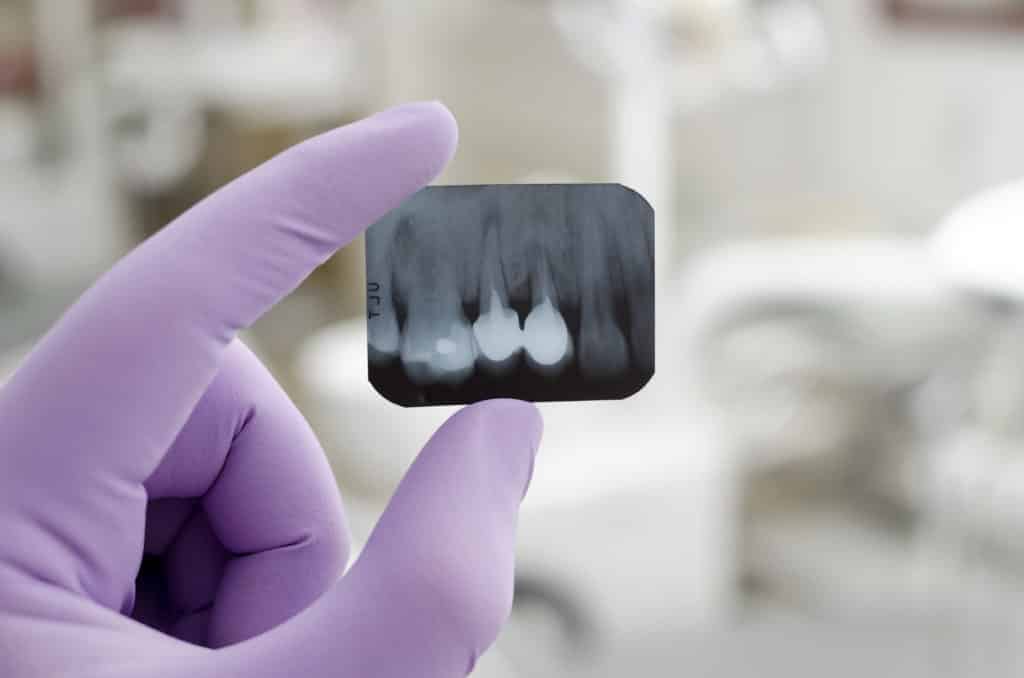Are dental x-rays safe?
Recently a patient at SpaDental Plymouth questioned why the dentist did not offer a shield during a dental x-ray.Practice Manager Louise Burgess shares her expert knowledge with us, as an experienced dental nurse:
“In the past, the patient and the clinical staff used to wear lead aprons when taking an x-ray. This is no longer the case. We are no longer required to wear dosage monitors either. These monitors would have been sent away for testing and then a report would be sent back with the level recorded.
With modern dental x-rays the level of radiation now is so very low professional bodies decided testing was no longer required.
We take a ‘normal’ set of bitewings at 2 year intervals, following NICE guidelines. We take a periapical (PA) x-ray that shows the whole tooth if a patient presents with pain, a fractured tooth, lost filling or during root canal treatments.”
Why do dentists take x-rays?
During a thorough review of a patient’s oral health, the dentist can often see problems, or feel them with a dental probe. However, there are often times when the dentist needs a better view of what is going on beneath the surface. For example, by taking digital ‘bite-wing’ x-rays the dentist can spot areas of decay developing between teeth before they become large enough to see with the naked eye. X-rays play an important role in most areas of dental care.
Children may need x-rays taken so the dentist can check how their teeth are forming and lining up. These images play an important role in planning ongoing treatments for young people. They help them to have well-aligned and healthy teeth.
The dentist takes x-rays of adult mouths to locate decay and, if necessary, plan root canal therapy. Moreover, adults need x-rays to assess concerns such as impacted teeth, abscesses, cysts, tumours or damage to the jaw bone.
Your dentist will take x-rays as necessary to monitor and plan your ongoing oral health. If you are concerned about whether your dental x-ray is safe, then ask you dentist to explain more. Ask about the reason for taking them, the process, and the recommended frequency. If the dentist identifies a higher risk of dental decay or periodontal concerns, the patient will need more regular x-rays.
Most of us are unaware of how much radiation there is in our lives
Radiation really is all around. And many of us don’t realise the levels we’re exposed to. Radiation occurs naturally in our environment. It’s in our soil, our water, and the air we breathe. Scientists who have understood and utilised radiation have given us great health benefits in diagnosing illness and treating it.
On a day to day basis, we are exposed to a lot more radiation in 12 months from just walking around than we would be from a dental x-ray. That doesn’t mean exposure to radiation is necessarily a good thing, but it is an element of our environment and very much a part of our modern life-styles.
Putting dental x-ray safety into perspective
The chart on the right helps us understand how dental x-ray safety ranks compared to other exposures. It looks at the effects from exposure to different levels of radiation. The unit used to quantify safety levels is the milli-Sievert (mSv).
It’s good to be aware and take care
When possible, it’s a better choice to lessen unnecessary exposure to radiation.
Prior to an appointment, patients who are pregnant, or think they could be, must inform their dentist. Obstetricians (and dentists) recommend patients avoid medications and dental x-rays with a low level of radiation, except in an emergency. However, as gum problems can develop during pregnancy, patients need to follow meticulous oral hygiene practices at home. Also a dental hygienist or therapist can help maintain the oral health of mothers-to-be.
Your feedback is important to us
This informational article is written in response to a review comment from one of our patients.
We regularly ask patients to review their treatment in the practices. The manager of the practice sending out the reviews, the SpaDental Practice Coordinator Lucy Dine Lucy Dine, and SpaDental administrators read all of the reviews patients submit after attending an appointment.
Your thoughts are very helpful. We reflect on your responses, and take action to improve our service. In addition, your reviews give us positive feedback that truly makes us feel appreciated for the work we do. Thank you!
Please be reassured that patient safety is a priority in all SpaDental practices. The management team regularly reviews and updates policies to ensure that standards set by the CQC are met or exceeded.
